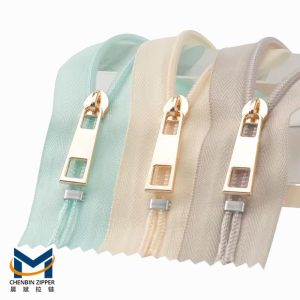Introduction
Nylon Zippers are essential in various industries, from fashion to outdoor gear. Their durability, flexibility, and wide range of applications make them a popular choice for manufacturers and DIY enthusiasts. This comprehensive guide will explore everything you need to know about nylon zippers, including where to buy them, their types, uses, and how to choose the right one for your project.
Understanding Nylon Zippers
Nylon zippers, also known as coil zippers, are made from continuous spirals of nylon filament. These spirals interlock to form the zipper’s teeth, creating a smooth and flexible closure. The nylon material offers several advantages:
1. Lightweight
2. Flexible and easy to curve
3. Resistant to rust and corrosion
4. Available in a wide range of colors
5. Durable and long-lasting
Types of Nylon Zippers
There are several types of nylon zippers available in the market:
1. Closed-end zippers: These have a fixed bottom stop and are commonly used in bags, pouches, and some clothing items.
2. Open-end zippers: These can be completely separated and are often used in jackets, hoodies, and sleeping bags.
3. Two-way separating zippers: These allow opening from both ends and are frequently used in outdoor gear and some types of clothing.
4. Invisible zippers: These have concealed teeth and are popular in dressmaking and formal wear.
5. Water-resistant zippers: These are treated to repel water and are used in outdoor equipment and waterproof clothing.
Where to Buy Nylon Zippers
Finding the right supplier for nylon zippers is crucial, whether you’re a professional manufacturer or a hobbyist. Here are some options to consider:
1. Local Fabric and Craft Stores
Many local fabric and craft stores carry a selection of nylon zippers. While they may not have the widest variety, they offer the advantage of being able to see and feel the zippers before purchasing. This can be particularly helpful if you’re working on a small project or need a zipper quickly.
2. Online Retailers
E-commerce platforms like Amazon, Etsy, and eBay offer a wide range of nylon zippers from various sellers. These platforms often provide customer reviews, which can help assess the quality of the zippers before making a purchase.
3. Specialized Zipper Suppliers
Many online stores specialize in zippers and other sewing notions. These suppliers often offer a broader selection of sizes, colors, and types of nylon zippers. Some popular options include:
– CB Zipper
– ZipperShipper
– ZipperStop
4. Wholesale Suppliers
If you need nylon zippers in large quantities, consider purchasing from wholesale suppliers. Many of these suppliers offer bulk discounts, which can significantly reduce your costs if you’re working on large-scale projects or running a business.
5. Manufacturer Direct
For the highest quality and most extensive selection, consider purchasing directly from zipper manufacturers. YKK, the world’s largest zipper manufacturer, offers a wide range of nylon zippers and accepts orders from businesses and individuals alike.
Choosing the Right Nylon Zipper
Selecting the appropriate nylon zipper for your project involves considering several factors:
1. Size
Zipper size refers to the width of the zipper teeth when closed. Common sizes for nylon zippers include:
#3: Fine, lightweight zippers suitable for delicate fabrics
#5: Medium-weight zippers often used in clothing and bags
#7: Heavy-duty zippers ideal for outerwear and luggage
#8: Extra heavy-duty zippers used for large bags, outdoor gear, and heavy outerwear
#10: Very heavy-duty zippers typically used for large tents, boat covers, and industrial applications
2. Length
Measure the opening where you plan to install the zipper to determine the required length. Remember that for closed-end zippers, you’ll need to account for the bottom stop in your measurements.
3. Color
Nylon zippers are available in a wide range of colors. Choose a color that complements or matches your project’s fabric. Some suppliers offer custom dyeing services for large orders.
4. Teeth Type
Consider the application of your zipper when choosing the teeth type:
– Vislon (molded plastic) teeth: More durable and suitable for heavy-duty applications
– Coil teeth: Flexible and smooth, ideal for curved applications
5. Special Features
Depending on your project, you may need zippers with special features such as:
– Water-resistance
– UV protection
– Fire-retardant properties
– Extra-long pulls for ease of use
Working with Nylon Zippers
Once you’ve purchased your nylon zippers, it’s essential to know how to work with them effectively:
1. Cutting Nylon Zippers
If you need to shorten a nylon zipper, follow these steps:
1. Mark the desired length on the zipper tape.
2. Sew across the zipper teeth at this mark using a zigzag stitch.
3. Cut the excess zipper tape about 1/2 inch below the stitching.
4. Use pliers to remove any excess teeth beyond the stitching.
2. Sewing Nylon Zippers
When sewing nylon zippers into your project:
1. Use a zipper foot on your sewing machine for precise stitching.
2. Pin or baste the zipper in place before sewing.
3. Start sewing from the bottom of the zipper, moving towards the top.
4. Be careful not to sew over the zipper teeth.
3. Maintaining Nylon Zippers
To ensure the longevity of your nylon zippers:
1. Keep them clean and free from debris.
2. Lubricate the teeth occasionally with a silicone-based lubricant.
3. Avoid forcing the zipper if it gets stuck; gently work it back and forth.
Nylon Zippers in Different Industries
Nylon zippers find applications in various industries due to their versatility and durability:
1. Fashion and Apparel
In the fashion industry, nylon zippers are used in:
– Dresses and skirts (often as invisible zippers)
– Jackets and coats
– Pants and jeans
– Sportswear and activewear
2. Outdoor and Recreational Gear
Nylon zippers are crucial components in:
– Tents and sleeping bags
– Backpacks and duffel bags
– Ski jackets and pants
– Life vests and wetsuits
3. Home Decor
In-home furnishings, nylon zippers are used for:
– Cushion covers
– Slipcovers
– Decorative pillows
– Curtains and drapes
4. Automotive Industry
Nylon zippers find applications in:
– Car seat covers
– Convertible tops
– Storage compartments
– Boat covers
Sustainability and Nylon Zippers
As sustainability becomes increasingly important in manufacturing, some zipper producers are exploring eco-friendly options:
1. Recycled nylon zippers: Made from post-consumer plastic waste
2. Biodegradable zippers: Designed to break down naturally over time
3. Water-saving production methods: Reducing the environmental impact of zipper manufacturing
When sourcing nylon zippers, consider asking suppliers about their sustainability practices and eco-friendly options.
DIY Projects with Nylon Zippers
Nylon zippers are perfect for various DIY projects. Here are some ideas to get you started:
1. Zippered pouches and pencil cases
2. Customized tote bags
3. Throw pillow covers with hidden zippers
4. Laptop or tablet sleeves
5. Upcycled clothing with added zippers for style or function
Conclusion
Nylon zippers are versatile, durable, and essential components in many industries and DIY projects. By understanding the types available, where to buy them, and how to choose the right one, you can ensure that your projects are functional, long-lasting, and professional-looking. Whether you’re a seasoned professional or a hobbyist, mastering the use of nylon zippers will undoubtedly enhance your crafting and manufacturing capabilities.
Frequently Asked Questions
Q1: What’s the difference between nylon and metal zippers?
A1: Nylon zippers are lightweight, flexible, and resistant to rust and corrosion. They’re ideal for curved applications and come in a wide range of colors. Metal zippers are more durable and have a classic look, but they’re heavier and can rust over time. Nylon zippers are generally more versatile and suitable for a broader range of applications.
Q2: How do I know what size nylon zipper to use?
A2: The size of the nylon zipper you need depends on your project. For lightweight fabrics and delicate items, use #3 zippers. For medium-weight projects like clothing and bags, #4.5 zippers work well. For heavy-duty applications like outerwear and luggage, choose #5 or larger zippers. Always consider the stress the zipper will be under and the aesthetic you’re aiming for when selecting a size.
Q3: Can nylon zippers be dyed?
A3: Yes, nylon zippers can be dyed, but it’s generally easier to purchase them in the desired color. If you need to dye a nylon zipper, use a dye specifically formulated for synthetic materials and follow the manufacturer’s instructions carefully. Keep in mind that the result may not be as vibrant or long-lasting as factory-dyed zippers.
Q4: Are nylon zippers waterproof?
A4: Standard nylon zippers are not waterproof, but they are water-resistant to some degree. For truly waterproof applications, look for specially treated water-resistant or waterproof nylon zippers. These zippers have a coating that helps repel water and are commonly used in outdoor gear and waterproof clothing.
Q5: How do I fix a nylon zipper that’s stuck or separating?
A5: For a stuck zipper, try lubricating it with a graphite pencil, bar soap, or a silicone-based lubricant. Gently work the slider back and forth to distribute the lubricant. If the zipper is separating, check if the slider is damaged or if any teeth are missing. You may need to replace the slider or the entire zipper if the damage is severe. For minor issues, realigning the teeth and carefully zipping and unzipping a few times might solve the problem.




